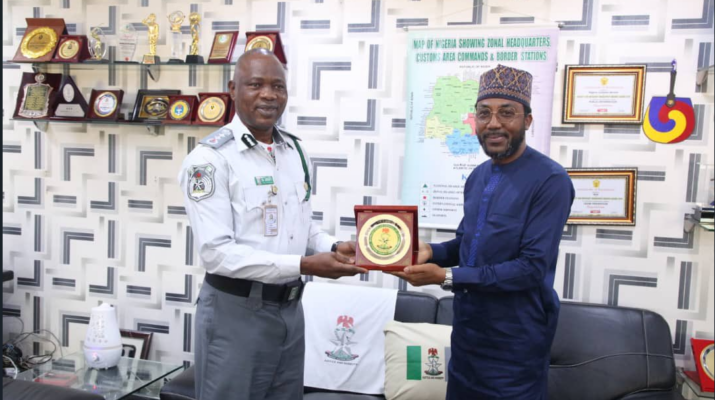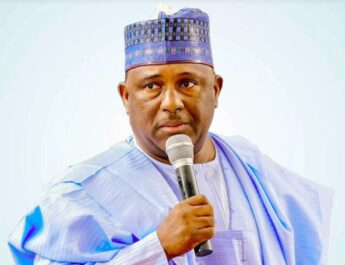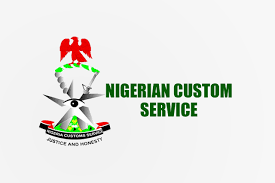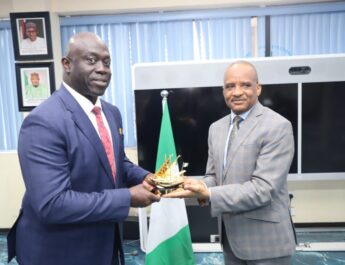The Nigerian Ports Authority (NPA) under the leadership of Mohammed Bello Koko vigorously pursues the achievement of sustainable efficient operations of the nation’s sea ports in the administration of President Bola Ahmed Tinubu, with the aim of achieving 24 hours operations, business-friendly port environment and increased revenue generation for the Federal Government
By Innocent Chukwu
The government of President Bola Ahmed Tinubu is deploying every available tool to ensure that the Nigerian economy can possibly harness its fair share of the $24 trillion worth potential in the global maritime business sector. In this wise, the Federal Government agency in charge of all the sea port terminals in the country, the Nigerian Ports Authority (NPA), has embarked upon an unrelenting pursuit of achieving a sustainable efficiency in sea port terminals operations in order to make good the noble objective of the current administration.
Since last year, the management of the NPA under the leadership of Mohammed Bello Koko as the Managing Director, has been identifying various avenues through which it hopes to transform the sea ports into a viable, competitive and world class international business hub to boost the economy, and benefit Nigeria’s landlocked neighbours. According to Bello Koko, part of the strategies to achieving sustainable port efficiency is the adoption of what he called “Port Community System (PCS)”, a practice which when fully developed and deployed, would bring government agencies and other identifiable stakeholders together for effective collaboration.
In the meantime, the NPA boss has stated that the PCS project has been propelled to its final stage of consultancy by the agency he heads under the technical guidance of the International Maritime Organization (IMO).
In the time past the NPA boss had harped on achieving the automation of the ports which can checkmate the influx of unwanted human elements into the ports. The NPA is also operating what is known as the Electronic Call-Up System or the Eto Call-Up System. This strategy helps to regulate the number of trucks that go in and out of the ports and to allocate time for them to operate through a Call-Up System. The NPA has also been emphasizing the importance of a 24-hours port operations in the country. When the 24-hours port operations are effectively achieved, they will practically reduce the cargo dwell time and reduce demurrage being paid by the business community on their cargoes in the ports.
The Agency is also collaborating with the Nigeria Customs Service (NCS) in the effort to establish a National Single Window Portal for government agencies and the maritime business community where information is mutually shared amongst them. These measures are aimed at bringing efficiency and competitiveness in the ports and ensure reduction in the cost of doing business in the nation’s ports.
They will also ensure effective collaboration to fight insecurity and recover lost Federal Government revenues, usher in effective inter-agency partnership, trade facilitation and reduced cargo dwell time.
For the purpose of collaboration to achieve ports efficiency in Nigeria, on Thursday, January 25, 2024, the Comptroller General of Customs (CGC), Bashir Adewale Adeniyi, had paid a courtesy visit to the Managing Director of NPA. At that visit, issues of collaboration to make the ports run smoothly and efficiently dominated their discussions.
At the meeting, the NPA and the NCS pledge to work together to deepen trade facilitation and drive exports as part of measures to support the Federal Government’s economic diversification effort. Adeniyi led members of his management team to NPA’s headquarters, Lagos for the visit.
Doing so, they stated, will improve Nigeria’s export earnings and facilitation of export cargoes onboard ocean going vessels.
The Managing Director of NPA, Bello-Koko said there was need to streamline export desks to make facilitation of cargoes onboard vessels seamless. The NPA boss, however, frowned at a situation where Export Processing Terminals (EPTs) report to export desk at the seaports.
“We have raised the issue of export. We have seen a tremendous increase in percentage and quantity of export cargo and we appreciate that but, we still have a little problem because we have an issue of multiple export desks.
“The first time we met, I raised the need to find a way to collaborate and collapse the export desks at the ports so that an exporter will report to that export desk where you have the combined desk. That way, it will be easier to facilitate export cargoes instead of multiple desks that currently existed, “he said.
Speaking further, Bello-Koko, urged the Customs CG to include the authority as part of the agencies of government that would benefit from the proceeds of auctioning of overtime cargoes at the ports. According to him, the authority expended huge funds in moving the overtime cargoes from the seaports to the Ikorodu terminal.
“On the issue of overtime cargo, the committee was set up where Nigerian Customs led and an assessment has been done. Everyone has gone round the port and we know the impact of overtime cargo on the activities of terminal operators. It has occupied a lot of economic space and it’s creating difficulty in clearing cargo because there isn’t space. The ports are very small, however, the auction has actually started, the bid has started and the overtime containers have been moved to some locations but in our initial discussions, we have asked that all the money Nigerian Ports Authority spends should also be considered.
“We have moved cargo to Ikorodu and we are also going to be involved in other expenditures. But, we saw a circular where somebody who was instructed did not do what exactly what he was instructed. They forgot to put NPA as one of the agencies of government that will benefit from the auction proceeds. I believe that you can stop them to correct that mistake because we have really spent a lot of money when it comes to overtime cargo. If we are able to do that we also believe that it should also be made a regular thing whether it’s quarterly or once a year but let it be something that we don’t need to wait for 10 or five years before overtime containers are moved out of the seaports. I am so happy to see that containers have already started leaving the terminals to locations where they will be auctioned. That showed that you are listening,” Bello-Koko said.
Responding, the Customs CG, stated that that the visit to NPA was to renew friendship and deepens existing relationship and collaboration.
According to him, the vision of NPA to ensure port efficiency would help the service facilitate trade and regain lost cargoes to neighboring countries’ ports.
“This visit is more of vision alignment because since NPA desires to achieve port efficiency, we believe in Customs that port efficiency would help to facilitate trade and also, NPA through all these programs is trying to promote the competitiveness of our ports this aligns with our vision because Nigerians are diverting their cargoes to neighboring ports and we must do everything to ensure that our ports remain competitive.
“The Nigerian economy is driven by our ports and finally we want to make our ports more efficient because when the ports are more efficient it would translate into better efforts in revenue generation so anything and everything that would help to reduce the time and the costs are what we would be exploring.
“if we go through all of these areas that have been mentioned they all speak to ensuring that we have better ports, more efficient ports, more competitive ports that speaks to our needs.”
Meanwhile, Bello-Koko and his Management team on Wednesday, February 7, 2024 met with the Managing Director and Global Head of Export and Agency Finance of CitiBank, Mr. Richard Hodder, to discuss low-cost financing for Tin Can and Apapa Port modernization projects.
According to Bello-Koko it was a follow-up meeting with other global reference lenders.
“We will continue to weigh different options for financing the port modernization programme to revamp our port infrastructure and superstructures for competitive advantage in the region”, Bello-Koko said.




